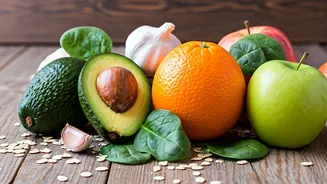Oats and Oatmeal
Oats and oatmeal are renowned for their soluble fiber content, a type of fiber that can significantly lower LDL (bad) cholesterol levels. The fiber found
in oats works by binding with cholesterol in the digestive system, preventing its absorption into the bloodstream. Including oats in your diet is simple and versatile. You can enjoy a warm bowl of oatmeal for breakfast, add oats to smoothies, or use oat flour in baking recipes. Regular consumption of oats can lead to noticeable improvements in cholesterol levels, reducing the risk of heart disease. Aim for a daily intake of at least 5-10 grams of soluble fiber from oats to maximize its benefits. Starting your day with oatmeal is a delicious and proactive step towards better heart health.
Beans and Legumes
Beans and legumes are excellent sources of soluble fiber, providing similar cholesterol-lowering effects to oats. These plant-based foods are packed with nutrients, including protein and various vitamins. Incorporating beans into your diet is easy; you can add them to soups, stews, salads, or side dishes. Common types include kidney beans, black beans, lentils, and chickpeas. Studies show that regularly eating beans can help lower LDL cholesterol and improve overall cardiovascular health. Aim for at least a half-cup serving of beans daily to reap the full benefits. Beans are not only heart-healthy but also a cost-effective and sustainable food choice, perfect for various culinary preferences.
Fatty Fish Power
Fatty fish, such as salmon, mackerel, and sardines, are rich in omega-3 fatty acids. Omega-3s are known to reduce triglycerides, lower blood pressure, and decrease the risk of blood clots. Eating fatty fish at least twice a week can significantly improve heart health. These fish are relatively easy to prepare, whether baked, grilled, or pan-fried. The omega-3 fatty acids in fish help lower harmful cholesterol levels and contribute to a healthier cardiovascular system. Besides its heart-healthy benefits, fatty fish also offers high-quality protein and essential nutrients. Ensure your diet includes regular portions of fatty fish to boost heart health and promote overall wellness.
Nuts and Seeds
Nuts and seeds, especially almonds, walnuts, and flaxseeds, are rich in healthy fats, fiber, and plant sterols, all of which contribute to lowering cholesterol. They are also packed with antioxidants and vitamins that support overall health. Snacking on a handful of nuts or seeds daily can provide substantial benefits. You can add them to salads, yogurt, or eat them as a snack. Walnuts, in particular, are known for their high omega-3 content, further benefiting heart health. Remember to consume nuts and seeds in moderation due to their calorie density. Regular consumption can lead to reduced LDL cholesterol levels and an improved lipid profile, reducing the risk of cardiovascular diseases. Choose a variety of nuts and seeds for a balanced intake of nutrients.
Fruits and Veggies
Fruits and vegetables, particularly those high in soluble fiber and antioxidants, play a crucial role in lowering cholesterol. Apples, berries, and citrus fruits are particularly beneficial due to their high pectin content, a type of soluble fiber. Vegetables like spinach and broccoli are also excellent choices. Aim to fill at least half your plate with fruits and vegetables at every meal. This helps lower LDL cholesterol and provides essential vitamins and minerals. Adding a variety of colorful fruits and vegetables to your diet ensures you get a wide range of nutrients that support heart health and overall well-being. These foods contribute to a healthier lifestyle and reduce the risk of chronic diseases.
Plant Sterol Foods
Plant sterols and stanols, found in fortified foods, are known to block the absorption of cholesterol in the body. These compounds are structurally similar to cholesterol, allowing them to compete for absorption in the gut. Foods like certain yogurts, orange juice, and other products are fortified with plant sterols. Consuming these foods can help lower LDL cholesterol levels significantly. The Food and Drug Administration (FDA) recommends consuming around 2 grams of plant sterols or stanols per day. It’s important to note that plant sterols are most effective when combined with a balanced diet and other cholesterol-lowering strategies. Plant sterols offer an extra tool for individuals looking to manage their cholesterol levels effectively.
Olive Oil's Impact
Olive oil, especially extra virgin olive oil, is rich in monounsaturated fats, which are heart-healthy fats. Regular consumption of olive oil can help lower LDL cholesterol levels while increasing HDL (good) cholesterol. Use olive oil for cooking, dressing salads, and drizzling over dishes. It also offers antioxidant benefits. Choose extra virgin olive oil for the highest quality and benefits. Replace saturated fats like butter and coconut oil with olive oil to get the most out of your dietary changes. It's a simple, effective, and delicious way to boost heart health and is a key component of the Mediterranean diet, known for its heart-healthy benefits.













